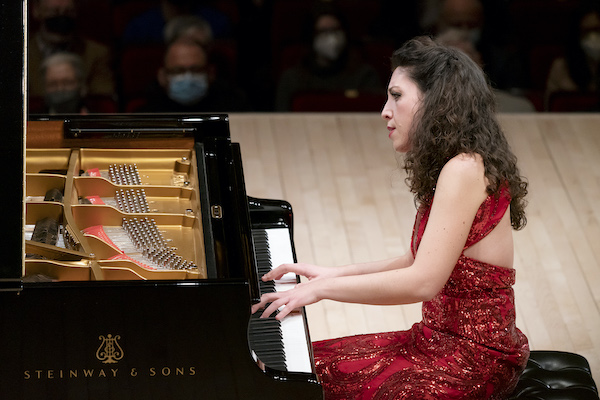Beatrice Rana’s Carnegie recital goes from flashy Chopin to characterful Debussy
Beatrice Rana’s home country has given the world countless musical terms, but the two that came to mind during the Italian pianist’s recital at Carnegie Hall Wednesday night were tempo rubato (“stolen time”) and a piacere (literally, “at [the player’s] pleasure,” or more loosely, “play it any way you want”).
Both denote a measure of freedom in playing what’s written on the page. In a program consisting of Chopin scherzos and more rewarding selections of Debussy and Stravinsky, Rana often seemed to be emulating the magisterial liberties of Maurizio Pollini. She had plenty to say along those lines, if not always as convincingly as her countryman.
Performing all four of Chopin’s furious scherzos at one go is a sign of the “completism” that now stalks recital programs, especially when it comes to Chopin. (Seong-Jin Cho, last month’s piano hero with the Vienna Philharmonic, had played the same four pieces two nights earlier, just down the road in Princeton, N.J.)
One understands the temptation: these four scherzos, and also the composer’s four ballades, each make a convenient recital unit, clocking in at about three-quarters of an hour. But this custom surely originated with record collectors, not with pianists and their audiences, because after hearing one or two of these digitally brilliant pieces with their socko endings, a feeling of “we’ve seen this movie before” almost inevitably sets in.
The antidote to that is to bring out, as much as possible, the individual character of each piece. Chopin avoided repeating himself, so there’s a lot to work with. But on Wednesday, as mad rush of presto alternated with glacial rallentando, Rana seemed more interested in bringing out the individuality of each page instead. So, along with a fine sense of the push-and-stretch of expressive rubato, an un-Chopinesque amount of a piacere entered the picture.
That is, until the last of the four scherzos. In this late piece, Chopin went a little rogue, with a dizzying array of starts and stops, runs and leaps, something completely different every few seconds. Rana’s response, fortunately, was to play the piece straight through in time, handing the steering wheel to the composer for one wild ride.
The virtues of her Chopin playing—fluent technique, artful voicing and a rich tonal palette—served her even better in the program’s second half, with Book I of Debussy’s Etudes and Stravinsky’s Three Movements from Pétrouchka.
Modeled on (and extending) Chopin’s etudes, these Debussy pieces are infrequent visitors to recital programs, no doubt because of their technical difficulty and because they aren’t “about” lily ponds or underwater cathedrals. But, playing with flow and spontaneity, Rana found loads of character in them.
In the etude “For five fingers,” one heard a piano student escaping the tedium of a Czerny exercise into a mad flight of fancy with moments of Pétrouchka-like brilliance. “For thirds” rushed and sparkled like a mountain stream. “For fourths” sighed and clanged with then-fashionable orientalism. “For sixths” shook brilliantly out of the pianist’s fingers. “For octaves” was the love child of Debussy and Liszt, sonorous and scintillating. And “For eight fingers” (look Ma, no thumbs!) generated a buzz and smear of notes with the hands bunched to form a very talented octopus.
It seemed that all of Debussy’s technical research, along with the pianist’s own variety of touch from pearly to muffled to marcato, enlivened Stravinsky’s Pétrouchka piece as it concluded Wednesday’s program. Big, sudden forte chords showed that a piano can sound jolting and “modern” without banging, and even as volatile and episodic a piece as the long scene “In Petrouchka’s Room” can have suspense and flow when the pianist keeps her eye on the dramatic goal.
The opener, the high-stepping “Russian Dance,” was over in a flash, a brilliant comet. The closing “Shrovetide Fair” built more slowly, vividly evoking a Russian tune floating over the soft hum of the crowd, until the hum grew to a roar and the pianist drove the piece inexorably to its crashing conclusion.
Rana responded to the enthusiastic applause with a calm-down encore, Saint-Saëns’s “The Swan,” delicately rendered in Leopold Godowsky’s filigreed arrangement. Then a dash through Chopin’s tempestuous Prelude in B-flat minor, Op. 28, No. 16, slammed the lid down on an evening that had improved markedly as it went along.
Pianist Gabriela Montero performs music by Schumann, Corea, Shostakovich and Montero, 7:30 p.m. March 18 in Carnegie’s Zankel Hall. carnegiehall.org; 212-247-7800.
